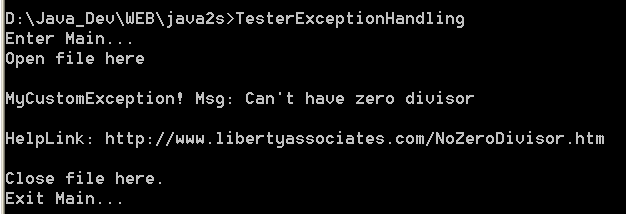Exception handle with your own exception class

/*
Learning C#
by Jesse Liberty
Publisher: O'Reilly
ISBN: 0596003765
*/
using System;
namespace ExceptionHandling
{
// custom exception class
class MyCustomException :
System.ApplicationException
{
public MyCustomException(string message):
base(message) // pass the message up to the base class
{
}
}
public class TesterExceptionHandling
{
public void Run()
{
try
{
Console.WriteLine("Open file here");
double a = 0;
double b = 5;
Console.WriteLine ("{0} / {1} = {2}",
a, b, DoDivide(a,b));
Console.WriteLine (
"This line may or may not print");
}
// most derived exception type first
catch (System.DivideByZeroException e)
{
Console.WriteLine(
"\nDivideByZeroException! Msg: {0}",
e.Message);
Console.WriteLine(
"\nHelpLink: {0}\n", e.HelpLink);
}
// catch custom exception
catch (MyCustomException e)
{
Console.WriteLine(
"\nMyCustomException! Msg: {0}",
e.Message);
Console.WriteLine(
"\nHelpLink: {0}\n", e.HelpLink);
}
catch // catch any uncaught exceptions
{
Console.WriteLine(
"Unknown exception caught");
}
finally
{
Console.WriteLine ("Close file here.");
}
}
// do the division if legal
public double DoDivide(double a, double b)
{
if (b == 0)
{
DivideByZeroException e =
new DivideByZeroException();
e.HelpLink=
"http://www.libertyassociates.com";
throw e;
}
if (a == 0)
{
// create a custom exception instance
MyCustomException e =
new MyCustomException(
"Can't have zero divisor");
e.HelpLink =
"http://www.libertyassociates.com/NoZeroDivisor.htm";
throw e;
}
return a/b;
}
static void Main()
{
Console.WriteLine("Enter Main...");
TesterExceptionHandling t = new TesterExceptionHandling();
t.Run();
Console.WriteLine("Exit Main...");
}
}
}
Related examples in the same category